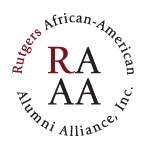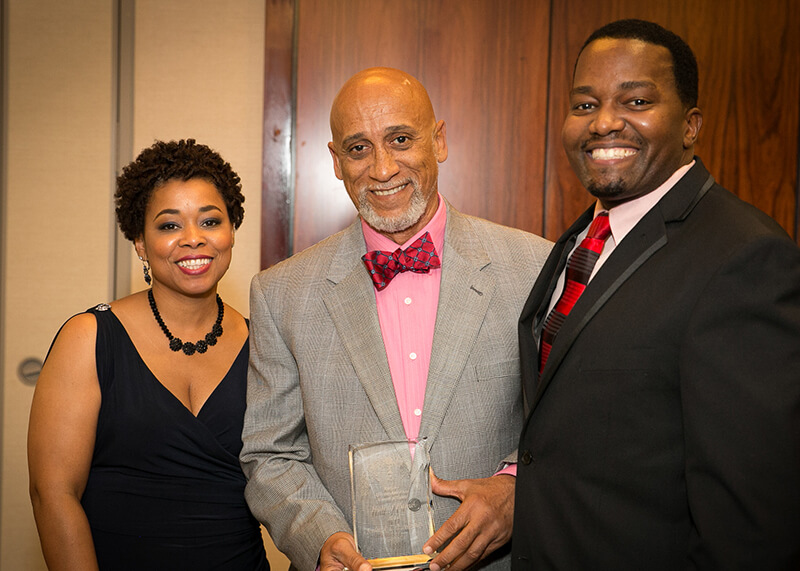Frederick L. Tyson is the son of the late Rev. A.D. Tyson, Jr. and the late Marion W. Tyson of Warren, Ohio. His siblings are the Rev. A. D. Tyson, III of Chicago, IL , Rev. Margaret V.L. Tyson of Warren, OH and the late Mark A. Tyson (Jersey City, NJ). He is the proud father of Christopher F. Tyson (Raleigh, NC) and Blair C. Tyson (Durham, NC) both musicians. He was born in Providence, RI and raised in Princeton and Newark, NJ. Prior to his matriculation at Rutgers, Dr. Tyson attended the Peddie School in Hightstown, NJ and graduated from Weequahic High School in Newark, NJ. In 1972 he was recognized by the Essex County Chapter of the National Football Foundation Hall of Fame as one of the top high school scholar-athletes in New Jersey. He also is a member of the Weequahic High School Alumni Association Hall of Fame. He also holds many trophies from his years in regional Tae Kwon Do competitions in New Jersey and North Carolina. He is an active member of the Rutgers University Football Letter Winners Association, having participated on both the Rutgers Lightweight and Varsity Football teams as an undergraduate. He also maintains membership with the Cook College Alumni Association.

Dr. Tyson is a 1977 graduate of Cook College with a BS in General Biology. He obtained his PhD in Zoology (Cell Biology and Developmental Genetics) under the mentoring of Dr. Francine B. Essien from The Rutgers University Graduate School in 1983. He did postdoctoral research in the Laboratory of Developmental Genetics at the Memorial Sloan-Kettering Institute for Cancer Research in New York City, where he received state of the art training in the molecular biology of nucleic acids (DNA &RNA) and protein biochemistry. He continued training as a medical oncology fellow at the Duke University Cancer Center (1985 – 1988) where he studied the molecular biology of human ovarian cancer and published the first observation of the amplification of the Her-2/neu oncogene in human ovarian tumors. He moved from Duke to the National Institute of Environmental Health Sciences/National Institutes of Health in Research Triangle Park, NC (1988 – 1993), where he served as a tenure track senior staff fellow in the Laboratory of Molecular Toxicology, studying chemical carcinogenesis in rodent animal models, developing several mouse lung cancer cell lines used for research as well as a panel of human pancreatic cancer cell lines. Dr. Tyson’s research career continued with a move to the Saccomono Cancer Research Institute in Grand Junction, CO (1993 – 1997), where he studied lung cancer susceptibility genes in a cohort of uranium miners. He did additional work focusing on the design, development, delivery and efficacy of novel anti-sense DNA based chemotherapeutic approaches for the treatment of pancreatic cancer. During this time, he was appointed to serve on the Board of Scientific Counsellors for the National Toxicology Program at the NIEHS.
In 1997, Dr. Tyson returned to full time government service at the NIEHS in North Carolina, where he began his career in science administration and program development. Tyson established landmark research programs addressing public health, environmental justice and health disparities in underserved populations in the US, leading a trans-NIH effort in establishing eight Centers for Population Health and Health Disparities at universities across the nation. He also developed and implemented the Advanced Research Collaboration in Environmental Health Program (ARCH), an award winning program established to enhance research capacity and infrastructure at Historically Black Colleges and Universities. Another contribution was the Environmental Health Science as an Integrative Context for Learning (EHSIC) a highly recognized program for developing K-12 educational curricula in environmental health sciences implemented at several schools across the nation to help educate K-12 teachers, students and their parents to become more aware of environmental exposures that can have adverse impacts on human health as well as teaching fundamentals of math and science.
Over the last 12 years, Dr. Tyson has narrowed his focus to develop national and international programs in Marine Toxicology (Oceans and Human Health) and Environmental Epigenomics. He worked to develop a collaboration between the NIEHS and the National Science Foundation (NSF) to establish and support a total of six Centers for Oceans and Human Health (OHH) and numerous individual research programs at research institutions across the nation focusing on the adverse human health effects of naturally occurring marine and freshwater harmful algal bloom toxins, pollution of waterways and global climate change. He has been an invited speaker at the prestigious Gordon Research Conferences on Oceans and Human Health both in 2012 and 2014 in Biddeford, ME, an international gathering of research scientists involved in OHH research. During this time he built a program in Environmental Epigenomics at the NIEHS, which focuses on supporting research to enhance our understanding of how environmental exposures impact human epigenomes and contributes to the development of complex human diseases. He is an internationally recognized expert in the field of epigenomics, serves as the Program Director for NIH Common Fund supported Roadmap Epigenome Mapping Consortium and is as a founding member of the International Human Epigenome Consortium (IHEC), serving on the IHEC Executive Committee. He has been an invited lecturer on epigenomics at several domestic venues and scientific meetings in: London, UK; Paris, France; Rome, Italy; Berlin, Germany; Nassau, Bahamas; Seoul, South Korea; Suzhou, China; and Vancouver, BC, Canada. In 2013, he along with collaborator Dr. Randy Jirtle formerly of Duke University and currently at the University of Wisconsin, edited two book volumes, entitled Environmental Epigenomics in Health and Disease, published by Springer-Verlaag. Along with Dr. Jirtle, Tyson has organized three large international meetings on epigenomics and human disease that have collectively had the participation of over 1000 scientists from 14 nations around the world.
Dr. Tyson is an active member of the St. Joseph AME Church in Durham, NC where he has served as a member of the Steward Board and sings with the Inspirational Singers, The Men of St. Joseph and the St. Joseph Mass Choir. He also served for many years as an Assistant Scoutmaster with Boy Scout Troop 137 (supported by St. Joseph AMEC), chaired the promotion committee and as a merit badge counselor for science, communication and cycling merit badges. He is an avid bicyclist as well. He assisted in the development of 25 Eagle Scouts in this African American Troop.
He is a member of the Durham (NC) Alumni Chapter of Kappa Alpha Psi Fraternity, Inc. and was initiated at the Eta Epsilon Chapter of Kappa Alpha Psi (Rutgers University) in April, 1975. In 1977, Tyson was recognized by the Northeastern Province of Kappa Alpha Psi Fraternity with that year’s award for Undergraduate Academic Achievement for his research on hemoglobin synthesis. As a member of the Durham (NC) Alumni Chapter, he has served on the Board of Directors and chaired the Beautillion Militaire Program for the Kappas of Durham Foundation, a mentoring, scholarship and leadership training program for college bound young men. During his six year tenure as chair of this nationally recognized program, over 100 young completed this training and were awarded close to $300,000 in college education assistance.
Dr. Tyson currently performs professionally with the Gospel Jubilators, an all-male a cappella group, who sing jubilee music with the soulful harmonies popularized in the 1930s and 40s.


